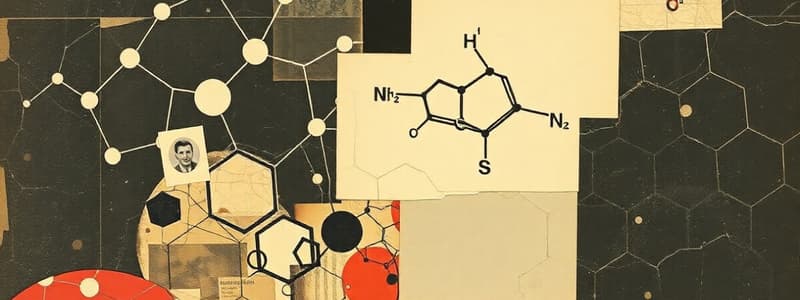Podcast
Questions and Answers
Which of the following is NOT considered an organic compound?
Which of the following is NOT considered an organic compound?
- Calcium carbonate (correct)
- Lipids
- Carbohydrates
- Proteins
What structural feature differentiates ethene from ethane?
What structural feature differentiates ethene from ethane?
- Absence of carbon atoms
- Formation of a ring structure
- Presence of a carbon-carbon double bond (correct)
- Presence of a carbon-carbon triple bond
Which of the following statements about organic compounds is true?
Which of the following statements about organic compounds is true?
- They can only consist of carbon and hydrogen.
- Their properties can change based on their associations with oxygen, nitrogen, and phosphorus. (correct)
- They do not include any elements other than carbon and hydrogen.
- They are always larger molecules compared to inorganic compounds.
Which of the following pairs represents examples of inorganic compounds?
Which of the following pairs represents examples of inorganic compounds?
An organic compound primarily made of long chains of hydrocarbons is likely to be which type of molecule?
An organic compound primarily made of long chains of hydrocarbons is likely to be which type of molecule?
Flashcards are hidden until you start studying
Study Notes
Organic Compounds
- Composed of carbon (C) and hydrogen (H), often with additional elements like oxygen (O), nitrogen (N), and phosphorus (P).
- Key examples include:
- Carbohydrates
- Lipids
- Proteins
- Nucleic acids
- Carbon's bonding capabilities allow for diverse structures, including:
- Single bonds (ethane): H-C-C-H
- Double bonds (ethene): H-C=C-H
- Triple bonds (ethyne): H-C≡C-H
Inorganic Compounds
- Lack both carbon (C) and hydrogen (H) in their structures.
- Common examples include:
- Carbon dioxide (CO₂)
- Calcium carbonate (CaCO₃)
Carbon's Association with Other Elements
- Bonding with oxygen, nitrogen, and phosphorus can significantly alter carbon's properties.
Studying That Suits You
Use AI to generate personalized quizzes and flashcards to suit your learning preferences.




